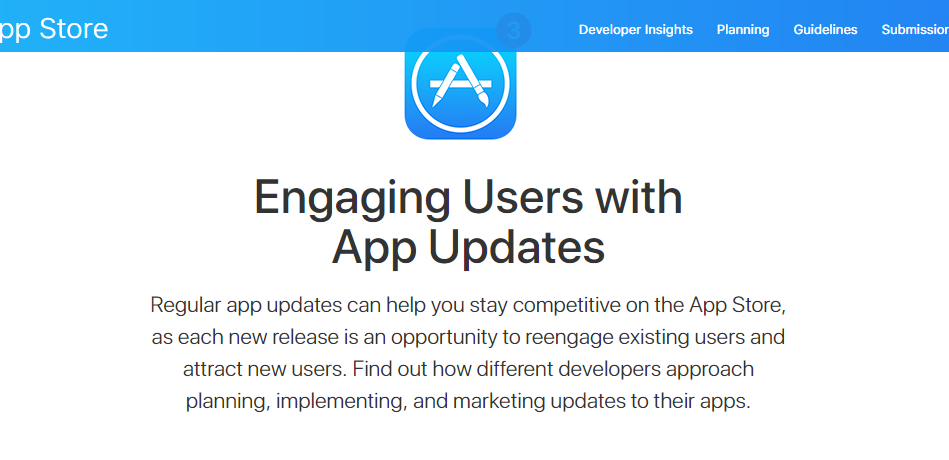Download our E-BOOK
4 Great Reasons to Update Your Mobile App
June 2, 2017
by Ashley Rondeau
No one likes stale bread, beer, or apps. While the first two are easily fixed, refreshing your company’s mobile app can be a chore. It takes development time and resources, and if you’ve ever checked out some of the millions of apps in Google or Apple’s app stores, you’ve seen a lot of businesses take a “good enough” attitude.
If you aren’t already updating your app every two weeks, which is about the sweet spot to be aiming for, your company should reevaluate the frequency of supporting your app. Need some convincing? Here are 4 reasons to update your company’s app sooner than later.
1. One glitch, you’re out.

A recent survey by QualiTest showed just how unforgiving the average mobile user is: 88% will abandon apps because of bugs or glitches. In fact, the report goes on to say that 51% would “abandon an app completely if they experienced one or more bugs in a day.”
Factor this in with the stat that 24% of users will abandon an app after just one use anyway, regardless of it being glitchy or not, and it’s clear that it’s a “one strike, you’re out” situation. And if you think your bugs will fly under their radar, think again: the survey noted that 78% of users notice glitches and bugs in their apps.
You don’t update your app just for updating sake. Your team should be constantly testing the app and performing quality checks to weed out these errors. By sticking to a bi-monthly update schedule, you’ll be able to quickly resolve bugs that just might lose you a customer.
2. It’s time to go 64-bit.

Apple says “jump,” you know what to do; and here we go again. Current beta versions of iOS 10.3 are popping up errors such as this for 32-bit apps:
photo by Andrew Cunningham via arstechnica
Thus, it seems like iOS 11 might be dropping support for apps that aren’t 64-bit. Millions of dusty apps in Apple’s App Store may be facing obsolescence due to this change. Now is the time for your business to update your 32-bit app if you haven’t already.
And while this is a one-off issue, we’ll continue to see mandates from both Apple and Google that force updates just to stay listed on their stores. The businesses that already have a habit of updating their apps regularly will be able to take these changes in stride, while those that have let their apps languish will always be playing catch up. If your company needs to update to 64-bit, use this opportunity to set a regular update schedule for your app.
3. Security or bust.

Mobile app users are becoming more savvy by the day, and honestly they have a good reason to be. Privacy in today’s mobile-first age is a huge concern. Just recently, research showed that “more than 70% of smartphone apps are reporting personal data to third-party tracking companies.” It doesn’t matter to users that many of these app do this for legitimate reasons such as location-based information; users will read this “7 out of 10” headline and be nervous to use any app.
Convincing your customers that your business cares about their privacy and online security is not just practical, but good for your bottom line. A recent report by Apadmi showed that the biggest reason shoppers hesitate to use a retail app is due to security concerns, and this leads to lost sales. According to Nick Black, CEO of Apadmi:
It remains clear that until retailers can convince consumers that their information and data will be secure, mobile shopping apps will fail to reach their full potential.”
By updating your app regularly to comply with the newest security concerns, and highlighting these changes in the changelog (release notes) on your app store listing, you will earn user trust with each iteration.
4. Every update is a marketing bump.

Let’s take it right from the horse’s mouth:
Yes, Apple makes it very clear that regular updates are one of the best ways to market your app, not only to those who have already downloaded them (to reengage with them), but to stay competitive in the App Store, because updated apps generally get a bump in the rankings.
App updates can also help build a loyal following, provided that the updates include relevant bug fixes and features that users are requesting. Frequent updates show you’re committed to the app and that it’s still being maintained. Having a loyal following for your app will help it spread on and offline. The most loyal users may even suggest your app as an option when people ask about alternatives to apps they are using now. This type of commitment could never be earned just through marketing alone.

They’re absolutely right, and your company’s commitment to consistent updates will have a direct impact on the success of your app with your target audience.
How often do you update your app? Can you push a release every two weeks?
Ready to turn your app idea into a market leader? Partner with Rocket Farm Studios and start your journey from MVP to lasting impact.”
Teams for App Development
We help companies build their
mobile app faster with go to market strategy

Technology and UX Audits

Early Design Sprints

MVP Creation

App Store

Growth Teams
Download Our Free E-Book
Whether you’re launching a new venture or scaling an established product, Rocket Farm Studios is here to turn your vision into reality. Let’s create something extraordinary together. Contact us to learn how we can help you achieve your goals.



